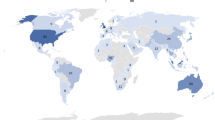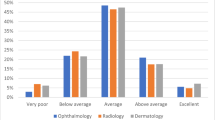Abstract
The use of artificial intelligence technologies (AIT) in medicine is increasing worldwide. In this study, it was aimed to evaluate the experiences, opinions, and future expectations of medical oncologists on artificial intelligence (AI). After the reliability and validity analyses were carried out by a pilot study, the main online questionnaire was sent to the members of the “Turkish Society of Medical Oncology” mail group by an invitation e-mail. The anonymized responses of the participants were analyzed. The median age of the 156 participants was 36 (34–43) years and half (51%) were male. Most (45%) were fellows. Forty-six percent were working in university hospitals, 56% were visiting 20–40 patients a day. Medical oncologists’ view of AIT was mostly positive (78%). However, some (especially women) had doubts about the reliability of AI (44%) and the establishment of its ethical/legal basis (49%). Sixty-five percent of the participants had no/superficial knowledge about AI. More than half (55%) had never used AI-based applications in their academic or clinical work. However, unlike now, 80% of the participants believed that they would use AIT frequently in their practice in the future and it would be beneficial. The most anticipated (81%) benefit was real-time information processing and real-time access to big data. Sixty-two percent believed that information about AI should be in the education curriculum. The vast majority of respondents (79%) thought that AI would not completely replace medical oncologists in the future. Some differences were found in the perception and experience of oncologists according to age, gender, title, and the number of patients examined per day. About AI, the general opinion of medical oncologists was positive, but their level of knowledge and use was low. However, they thought they would use it frequently in future and needed training.




Similar content being viewed by others
Data availability
The data of the study can be accessed by contacting ES.
References
Xu Y, Liu X, Cao X, Huang C, Liu E, Qian S, et al. Artificial intelligence: a powerful paradigm for scientific research. Innovation (Camb). 2021;2(4): 100179. https://doi.org/10.1016/j.xinn.2021.100179.
Mariani MM, Perez-Vega R, Wirtz J. AI in marketing, consumer research and psychology: a systematic literature review and research agenda. Psychol Mark. 2022;39(4):755–76. https://doi.org/10.1002/mar.21619.
Bohr A, Memarzadeh K. The rise of artificial intelligence in healthcare applications. Artif Intell Healthcare. 2020. https://doi.org/10.1016/B978-0-12-818438-7.00002-2.
Shimizu H, Nakayama KI. Artificial intelligence in oncology. Cancer Sci. 2020;111(5):1452–60. https://doi.org/10.1111/cas.14377.
Chen ZH, Lin L, Wu CF, Li CF, Xu RH, Sun Y. Artificial intelligence for assisting cancer diagnosis and treatment in the era of precision medicine. Cancer Commun (Lond). 2021;41(11):1100–15. https://doi.org/10.1002/cac2.12215.
Hinton G. Deep learning-a technology with the potential to transform health care. JAMA J Am Med Assoc. 2018;320(11):1101–2. https://doi.org/10.1001/jama.2018.11100.
Yu H, Beam AL, Kohane IS. Artificial intelligence in healthcare. Nat Biomed Eng. 2018;2(10):719–31. https://doi.org/10.1038/s41551-018-0305-z.
Blease C, Kaptchuk TJ, Bernstein MH, Mandl KD, Halamka JD, Desroches CM. Artificial intelligence and the future of primary care: exploratory qualitative study of UK general practitioners’ views. J Med Internet Res. 2019. https://doi.org/10.2196/12802.
Oh S, Kim JH, Choi SW, Lee HJ, Hong J, Kwon SH. Physician confidence in artificial intelligence: an online mobile survey. J Med Internet Res. 2019. https://doi.org/10.2196/12422.
Doraiswamy PM, Blease C, Bodner K. Artificial intelligence and the future of psychiatry: ınsights from a global physician survey. Artif Intell Med. 2020. https://doi.org/10.1016/j.artmed.2019.101753.
van Hoek J, et al. A survey on the future of radiology among radiologists, medical students and surgeons: students and surgeons tend to be more skeptical about artificial intelligence and radiologists may fear that other disciplines take over. Eur J Radiol. 2019. https://doi.org/10.1016/j.ejrad.2019.108742.
European Society of Radiology (ESR). Impact of artificial intelligence on radiology: a EuroAIM survey among members of the European Society of Radiology. Insights Imaging. 2019;10(1):105. https://doi.org/10.1186/s13244-019-0798-3.
Sarwar S, Dent A, Faust K, et al. Physician perspectives on integration of artificial intelligence into diagnostic pathology. npj Digit Med. 2019;2:28. https://doi.org/10.1038/s41746-019-0106-0.
Ara Shaikh A, Kumar A, Jani K, Mitra S, García-Tadeo DA, Devarajan A. The role of machine learning and artificial ıntelligence for making a digital classroom and its sustainable ımpact on education during Covid-19. Mater Today Proc. 2022;56:3211–5. https://doi.org/10.1016/j.matpr.2021.09.368.
Pecqueux M, et al. The use and future perspective of Artificial Intelligence—a survey among German surgeons. Front Public Health. 2022. https://doi.org/10.3389/fpubh.2022.982335.
Scheetz J, Rothschild P, McGuinness M, Hadoux X, Soyer HP, Janda M, et al. A survey of clinicians on the use of artificial intelligence in ophthalmology, dermatology, radiology and radiation oncology. Sci Rep. 2021;11(1):5193. https://doi.org/10.1038/s41598-021-84698-5.
O’Shaughnessey J, Collins ML. Radiation therapist perceptions on how artificial intelligence may affect their role and practice. J Med Radiat Sci. 2023;70(S2):6–14. https://doi.org/10.1002/jmrs.638.
Frank MR, et al. Toward understanding the impact of artificial intelligence on labor. Proc Natl Acad Sci USA. 2019;116(14):6531–9. https://doi.org/10.1073/pnas.1900949116.
Zheng B, Wu M-n, Zhu S-j, et al. Attitudes of medical workers in China toward artificial intelligence in ophthalmology: a comparative survey. BMC Health Serv Res. 2021;21:1067. https://doi.org/10.1186/s12913-021-07044-5.
Gong B, et al. Influence of artificial intelligence on Canadian medical students’ preference for radiology specialty: a national survey study. Acad Radiol. 2019;26(4):566–77. https://doi.org/10.1016/j.acra.2018.10.007.
Collado-Mesa F, Alvarez E, Arheart K. The role of artificial intelligence in diagnostic radiology: a survey at a single radiology residency training program. J Am Coll Radiol. 2018;15(12):1753–7. https://doi.org/10.1016/j.jacr.2017.12.021.
Kust D, Murgic J, Vukovic P, Kruljac I, Prpic M, Zilic A, et al. Oncologist burnout syndrome in eastern Europe: results of the multinational survey. JCO Oncol Pract. 2020;16(4):e366–76. https://doi.org/10.1200/JOP.19.00470.
Coiera E. The fate of medicine in the time of AI. Lancet. 2018;392(10162):2331–2. https://doi.org/10.1016/S0140-6736(18)31925-1.
Kohane IS, Drazen JM, Campion EW. A glimpse of the next 100 years in medicine. N Engl J Med. 2012;367(26):2538–9. https://doi.org/10.1056/nejme1213371.
Beam AL, Kohane IS. Translating artificial intelligence into clinical care. JAMA J Am Med Assoc. 2016;316(22):2368–9. https://doi.org/10.1001/jama.2016.17217.
Acknowledgements
I would like to thank all professors/associate professors who commented and directed me for the improvement of the questionnaire and all my colleagues who filled out the questionnaire.
Funding
This research received no external funding.
Author information
Authors and Affiliations
Contributions
All stages of the article were carried out by ES.
Corresponding author
Ethics declarations
Conflict of interest
The author declares no conflict of interest.
Ethical approval
The current study was conducted in accordance with the Declaration of Helsinki and approved by the local Institutional Ethics Committee (protocol code 2023/5/51, 17.07.23).
Consent to participate
Informed consent was waived. Because this is a study carried out with an online survey. The survey was sent to the members of the “Turkish Society of Medical Oncology” mail group with an invitation e-mail. The participants were informed at the outset of the questionnaire that their participation was voluntary, and they were assured that their responses would remain confidential and not be shared with any third parties. Only those individuals who acknowledged this explanation and clicked on the “I accept” button were granted access to the questionnaire.
Additional information
Publisher's Note
Springer Nature remains neutral with regard to jurisdictional claims in published maps and institutional affiliations.
Supplementary Information
Below is the link to the electronic supplementary material.
Rights and permissions
Springer Nature or its licensor (e.g. a society or other partner) holds exclusive rights to this article under a publishing agreement with the author(s) or other rightsholder(s); author self-archiving of the accepted manuscript version of this article is solely governed by the terms of such publishing agreement and applicable law.
About this article
Cite this article
Sahin, E. Are medical oncologists ready for the artificial intelligence revolution? Evaluation of the opinions, knowledge, and experiences of medical oncologists about artificial intelligence technologies. Med Oncol 40, 327 (2023). https://doi.org/10.1007/s12032-023-02200-9
Received:
Accepted:
Published:
DOI: https://doi.org/10.1007/s12032-023-02200-9




